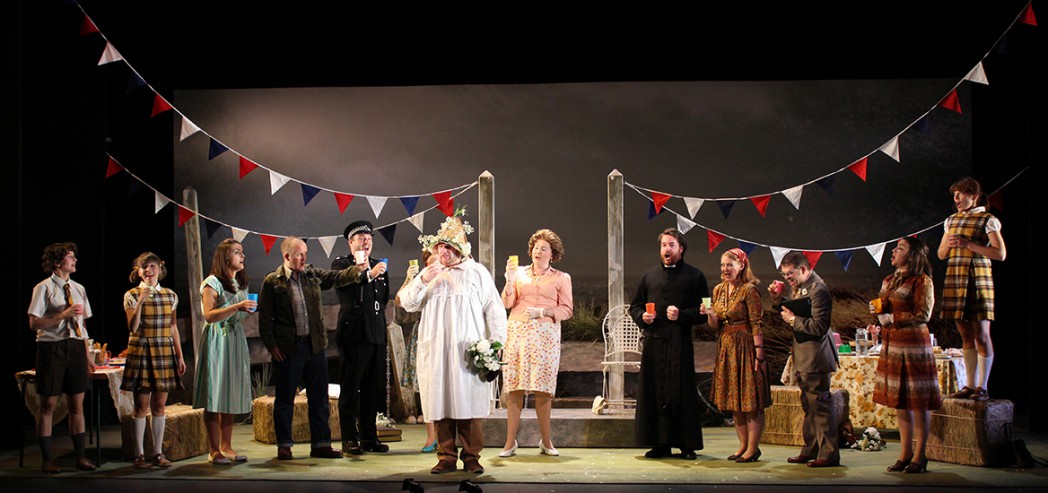Co-production by Mid Wales Opera and Opera Theatre Company, Dublin
Mid Wales Chamber Orchestra
Conductor: Nicholas Cleobury
Director: Michael Barker-Caven
Borough Theatre Abergavenny, 9th October 2013 and touring

Photo by Adam Wiltshire
Mid Wales Opera’s principal contribution to the celebrations of the centenary of Benjamin Britten’s birth this year is a revival of his ‘comedy opera’ Albert Herring. In terms of scale it is an ideal choice for a touring company. Single instrumentation means that the twelve members of the orchestra could – just! – squeeze into the space provided by the removal of the two front rows of the stalls in Abergavenny’s Borough Theatre, though the absence of a real pit provides a challenge for the balance between the density of the orchestral writing and voices at times. That said, the singers gave the production the necessary verve and vocal energy to carry them through.
Albert Herring was Britten’s second attempt at chamber opera, following closely on the heels of the The Rape of Lucretia, which was not well-received. Glyndebourne’s proprietor at the time, John Christie, carried the huge financial losses, and refused to be responsible for its successor. This led Britten and his librettist, Eric Crozier, to form The English Opera Group and, in due course, found the Aldeburgh Festival. Albert Herring is a curiosity – Britten never returned to comedy – but has proved popular with audiences at its première in 1947 and since over the years.
The Borough Theatre in Abergavenny has a seating capacity of about 300, and for this performance was about half full, a very respectable turn-out for a (relatively) modern opera. A friend of mine who was there and knew only the name, said that she enjoyed it a lot and found it ‘very original’. Her comment made me think and remember that a performance is always potentially a contract with each member of the audience, and that if it reaches them it has done its job. For me however, the piece itself, although entertaining and certainly never tedious, was very dated. Britten’s portrayal of village life is a thing of the past. His parodied characters of the lady of the manor, vicar, village policeman and so forth seem to me quaint but not really funny. This production appeared to be set in the 1970s, as far as I could tell from the prices in Herrings’ greengrocery and the costumes. This was perhaps in line with director Michael Barker-Caven’s nostalgia for his youth in the Suffolk of that period. I have no argument with such a setting, but I was surprised that a touring production used such an elaborate and fussy set design. I wondered why we had apparently unnecessary little topiary bushes in the first scene. They were transformed rather neatly into fruit and other produce displays in the Herrings’ shop, but other elements of the design were less successful, and provided more potential for distracting set change problems than enhancement of the action.
Britten had an interest in the character of the outsider throughout his composing career, so this may be what drew him to the Maupassant story adapted for Albert Herring. Young tenor Christopher Turner approaches the role with intelligence, and has made him more than the simpleton sometimes portrayed. After all, if he was merely such his transformation in the final scene would be extremely far-fetched. Crowned King of the May, Albert was like Shakespeare’s Bottom translated to an ass, poor lad, but the young lovers failed to gull him. And maybe at the end Albert does show the possibility of escape from a stifling past.
All credit to the work on characterisation done by all the singers. Acting in opera has improved so much since more attention has been paid to it in colleges. Catrin Aur’s portrayal of Lady Billows was rather like a parody of Meryl Streep playing Margaret Thatcher, but why not?! It is invidious to single out particular singers in an ensemble, as all take equal credit for success of the piece as a whole. Having said that, for me Amy J Payne as Lady Billows’ housekeeper Florence Pike stood out as a singer to watch in the future.
Mid Wales Opera is touring this production to venues in Wales and England. It is excellent that opera is being taken to audiences in places like Aberdare and New Brighton. And if the whoops at the end of the Abergavenny performance are anything to go by, it is a production that people enjoy, even if they don’t go away singing the tunes.


 Enjoyed this article? Support our writers directly by buying them a coffee and clicking this link.
Enjoyed this article? Support our writers directly by buying them a coffee and clicking this link.







